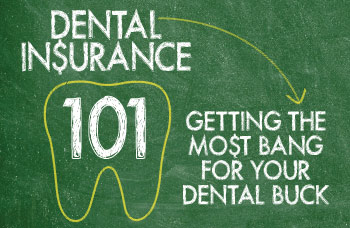Dental Insurance 101
Getting The Most Bang For Your Dental Buck

Healthcare consumers often find dental insurance frustrating and confusing. That's because what we expect it to do is not actually what it's set up to do. Most people associate the word “insurance” with the concept of protection. We buy insurance to safeguard ourselves against unforeseen, large expenses. For example, if we suffer a car crash, house fire or broken leg, our auto, homeowner's or medical insurance policy will help make us whole — financially and, to the extent possible, health-wise. So it's understandable that the same would be expected of dental insurance. After all, it's insurance, right? Well, truth be told, not really.
Dental insurance is not designed to pool risk or to protect anyone from unforeseen expenses, which is traditionally what insurance is designed to do.
What we call “dental insurance” most often functions more like a discount coupon than a form of insurance. In fact, it's simply a way for employers to help their employees offset some of the cost of dental care. It is not designed to pool risk or to protect anyone from unforeseen expenses, which is traditionally what insurance is designed to do. That's because, unlike car accidents, house fires and even medical needs, dental expenses are, believe it or not, fairly predictable over time. You need to visit the dentist at least twice a year to maintain optimal dental health. If you take care of your teeth, they will take care of you. So instead of protecting you from unexpected costs, dental insurance helps pay expenses that are rather easy to anticipate.
Because of this relative predictability, most dental insurance companies know what their claims experience will be, and can sell plans to employers accordingly.
Fee-for-service plans are the most common form of dental insurance, in which you choose the dentist and the insurance company picks up part (sometimes all) of the bill based on a fee schedule detailed in the policy. Here's how they basically work: The insurance company charges your company (employer) a premium for each employee, to cover their dental needs, predicting that only a percentage of employees will need and/or use care. The premiums are based on the type of coverage chosen by your employer, and as you might expect the more that is covered the higher the premium. The dental procedures that are covered, and the fees for them, are agreed to by your employer and the insurance company, but they may not, in fact, be what your dentist actually charges for a given procedure, even if the level of reimbursement is described as “usual, customary, and reasonable” (UCR). This may leave you footing a larger portion of the bill than you may have expected. Again, it all depends on how much money your employer is willing to put towards employee dental care and the deal that's been worked out between the business you work for and the insurance company.
Most dentists understand their patients' financial constraints and do their best to help them navigate through their policies to a workable solution; but they cannot allow an insurance company's rules to dictate your treatment needs. A dentist's priority is your dental health, not saving money. When a dentist recommends a form of treatment insurance won't pay for, the patient often feels caught in the middle.
Dental insurance, then, is basically a perk some employers offer in various forms to attract and keep employees. But businesses are only willing to go so far to do this, especially in today's economy. While they want their employees to stay healthy (and avoid missing work days), their own bottom line is their main concern. They will offer what they feel they can afford, leaving the rest up to the individual.
It's A Business Arrangement
You will sometimes need the help of your dentist and his or her staff to understand your coverage and make informed decisions that will put your health first.
What you actually get from your dental plan depends on what your employer negotiated with the insurance company administering that plan; it's a business arrangement between the two of them that actually may have very little to do with your individual dental needs. You will sometimes need the help of your dentist and his or her staff to understand your coverage and make informed decisions that will put your health first. It's important to remember that maintaining optimal health is not the purpose of most dental plans.
That said, preventive services, in the form of twice-yearly cleanings, exams and fluoride treatments, for example, are actually procedures that a lot of dental plans cover fully. That's because they're relatively inexpensive, and save costs in the long run by promoting good dental health. As for other benefits, these can vary widely. You might find your plan pays only 50% of the fee for a crown and excludes more expensive yet highly beneficial services (such as implants) entirely. Typically, there will also be a deductible that you have to pay out-of-pocket before you receive any benefits, and a maximum amount your insurance will pay each year.

When you think about it, this is exactly the opposite of how, say, your car insurance works. According to one expert, “If car insurance were designed like a dental plan, an oil change and tune-up would be covered at 100%; shocks, tires, and batteries would be reimbursed at 80%; and accidents would be reimbursed at 50%, with an annual maximum limit of $1,000.”
If you are contemplating buying your own dental insurance as an individual, then, you will probably find that it is not worth the money. The average person without dental insurance spends about $200 a year on basic dental care, while yearly premiums for dental insurance can run $500 or more. Then there is the deductible the patient must pay before receiving any reimbursement, and the yearly maximum limit on how much the patient can receive from the policy — usually $1,000 or $1,500. It's worth noting that these maximum benefit levels have remained virtually unchanged for decades, even as the cost of dental care has steadily increased.

